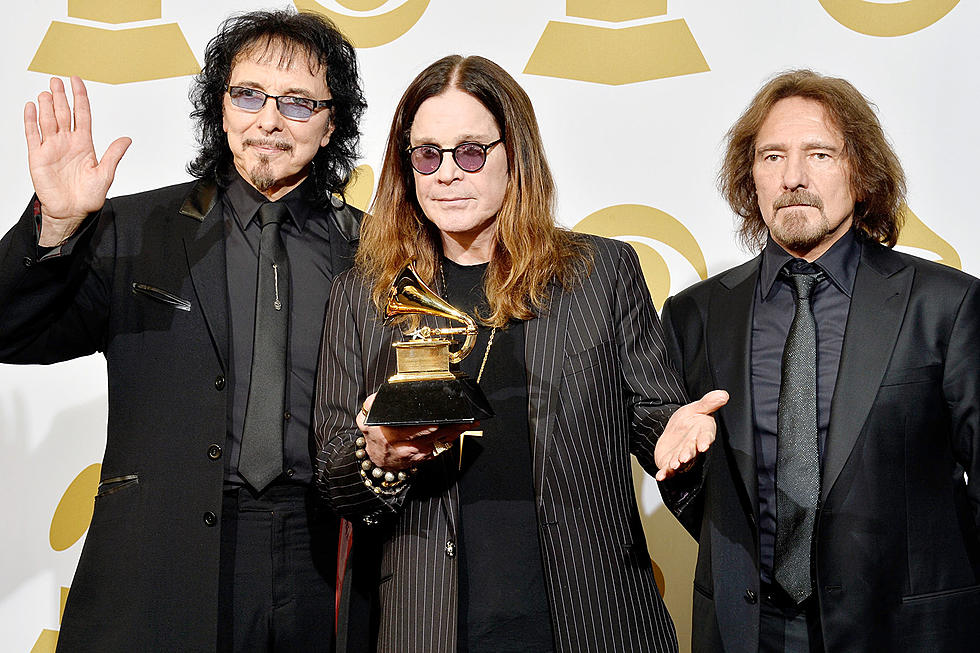
How Tony Iommi’s ‘Seventh Star’ Barely Kept Black Sabbath Alive
Guitarist Tony Iommi unveiled what was meant to be his first solo album, Seventh Star, on Jan. 28, 1986. Except pressure from his record company ultimately saw the LP branded as a yet another Black Sabbath release ("Black Sabbath Featuring Tony Iommi," to be precise), and it would go down as one of metal's most misunderstood and unfairly maligned albums.
The irony of it all is that just a few months earlier, rumors of a full-fledged reunion of Black Sabbath's original foursome – Iommi, singer Ozzy Osbourne, bassist Geezer Butler and drummer Bill Ward – had greatly intensified following their one-off appearance at the globally televised Live Aid charity extravaganza.
But despite that brief public display of hatchet-burying bonhomie, band relationships were, in fact, at an all-time low, and their business affairs at complete loggerheads (Sharon Osbourne and her father, Black Sabbath manager Don Arden, were engaged in a volatile family feud). As Osbourne told writer Mick Wall when interrogated on the matter, "No fucking way, mate!"
All of these mitigating factors left Iommi with two choices: try to revive Black Sabbath by recruiting an entirely new lineup or, like Osbourne, work as a solo artist. He chose the latter ... or so he thought.
For starters, the guitarist approached several singers to contribute vocals and lyrics to his new songs, including Rob Halford, David Coverdale, Robert Plant (all of whom politely declined) and even his old sparring partner Ronnie James Dio, before landing on former Deep Purple and Trapeze shouter Glenn Hughes, who sang all the leads. “We did the record really quickly, [and] I must stress that all the way through I was told this was Tony’s solo record,” Hughes recalled in Garry Sharpe-Young’s Metal: The Definitive Guide.
The various session players – including Sabbath keyboard stalwart Geoff Nicholls, ex-White Lion bassist Dave “The Beast” Spitz and drummer Eric Singer – hired for the recording at Los Angeles Cherokee Studios thought the same thing. Nevertheless, Seventh Star was duly completed in the fall of 1985 and, reflecting its origin as Iommi’s solo debut, contained a variety of songwriting styles well beyond the well-established Black Sabbath template.
Listen to Black Sabbath Perform 'Seventh Star'
Songs like the melancholy ballads “No Stranger to Love” and “Angry Heart/In Memory,” the modernized melodic hard rock of “Danger Zone” and the bluesy “Heart Like the Wheel” sounded like nothing Iommi had played since that very first seminal Sabbath LP way back in 1970.
Still, seeing as this was the work of a metal visionary, Seventh Star also boasted its share of head-banging delights, such as the twin-barrel speed metal attack of “In for the Kill” and “Turn to Stone,” and the doom-laden mysticism of the title track and its mood-setting instrumental intro, “Sphinx (The Guardian).” Every one of these “solo” songs was carried forward by Hughes’ soulful versatility. But, as he reflected later, he was “horrified” when he realized that “Oh no, I have to go out on tour as the singer for Black Sabbath. How am I going to explain this to Ozzy?”
To make matters worse, around the same time that Seventh Star was struggling to find a foothold on the charts, Osbourne released one of his most successful solo albums, The Ultimate Sin. His world tour was a huge success, too. But Sabbath’s was a disaster: Just a few dates in, the struggling Hughes had to be dismissed due to increasing difficulties with his voice (which was incompatible with Sabbath’s older catalog) and a well-documented cocaine problem. Hughes told Sabbath biographer Mick Wall in the book Symptom of the Universe, “Even when I was loaded, I could sing in the studio, but not always onstage.”
Hughes’ mostly unknown replacement Ray Gillen had to face half-empty venues on most nights through to tour’s end, bringing this period to an ignominious conclusion. It didn't help matters that Iommi struggled to keep a new Black Sabbath lineup together in the years to come. But looking back, Seventh Star can be appreciated on its own merits. It's a good solo album unfairly labeled as a Black Sabbath LP.
Rock's Ugliest Band Breakups
Why Black Sabbath Hated One of Their Own Albums
More From 94.5 KATS










